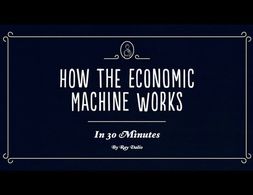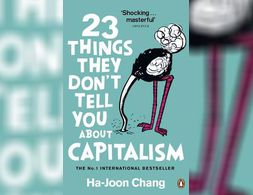✕
34 results
The author identifies three principal economic phenomena, which are explained: long run productivity growth as the central driver of increasing economic activity, short-term and long-term debt cycles. The latter two are explained to some detailed with reference to money creation, central banking and long term crisis tendencies. With regards to the long run debt cycle, which leads into deleveraging and recession, some policy measures which can smoothen the crisis are discussed.
In this ambitious and impressive new book, journalist Howard French seeks to excavate the long elided central importance of the African continent as the “linchpin of the machine of modernity.” In the story of modernity, he writes, the role of Africa is diminished, trivialized, and erased, and by filling in some gaps in this story, he retells the story of modernity.
A historical glimpse of how economists of the 19th century debated the usefulness of mathematics to economics
The outbreak of COVID-19 has substantially accelerated the digitalization of the economy. Yet, this unprecedented growth of digital technology brought novel challenges to the labour market. Rise in income inequalities and precarious working conditions or polarization of jobs. In this essay, we try to assess what tools to use to counter these trends.
In the history of the social sciences, few individuals have exerted as much influence as has Jeremy Bentham. His attempt to become “the Newton of morals” has left a marked impression upon the methodology and form of analysis that social sciences like economics and political science have chosen as modus operandi.
This paper starts with an evaluation of three common arguments against pluralism in economics: (1) the claim that economics is already pluralist, (2) the argument that if there was the need for greater plurality, it would emerge on its own, and (3) the assertion that pluralism means ‘anything goes’ and is thus unscientific. Pluralist responses to all three arguments are summarized. The third argument is identified to relate to a greater challenge for pluralism: an epistemological trade-off between diversity and consensus that suggests moving from a discussion about ‘pros’ and ‘cons’ towards a discussion about the adequate degree of plurality. We instantiate the trade-off by showing how it originates from two main challenges: the need to derive adequate quality criteria for a pluralist economics, and the necessity to propose strategies that ensure the communication across different research programs. The paper concludes with some strategies to meet these challenges.
Complexity economics focuses on interactions and interdependencies between individuals and structures in economic systems. Those are systems of organised complexity. High importance is given to the analysis of networks.
In this new book Smith returns to Solow s classic productivity paradox which essentially states that we can see automation everywhere like the spheres of leisure sociality and politics but not in the productivity statistics He examines why labor saving automation in the service age in the Global North has …
Institutional economics focuses on the role of social institutions in terms of laws or contracts, but also those of social norms and patterns of human behaviour that are connected to the social organisation of production, distribution and consumption in the economy.
An essay of the writing workshop on Nigeria’s Readiness for and the Effect of the Fourth Industrial Revolution
As the Covid-19 fueled economic downturn begins to intensify this winter, an extended study of the Italian cooperative sector’s historical resilience in times of crisis can serve as a learning experience for other countries seeking to create policies that foster more stable economies, with job security, care for marginalized communities and adequate counter-cyclical policies. Particularly, the Italian cooperative sector’s contributions to three aspects should be noted in closing. Firstly, the innovative phenomenon of cooperative enterprises has contributed to social inclusion of immigrant communities, the activation of youth, the unemployed and people with disabilities, a true compensation for both a market and state failure. Secondly, they have contributed to a reduction in income and wealth inequalities at a time when the issue of inequality is of global significance. Thirdly, the Italian cooperative movement has helped local communities revitalize in the face of demographic shifts and rendered them more resilient to the ravages of globalization. Each of these in their own right is a remarkable achievement.
By conducting a discourse analysis (SKAD) in the field of academic economics textbooks, this paper aims at reconstructing frames and identity options offered to undergraduate students relating to the questions ‘Why study economics?’ and ‘Who do I become by studying economics?’. The analysis showed three major frames and respective identity offerings, all of which are contextualized theoretically, with prominent reference to the Foucauldian reflection of the science of Political Economy. Surprisingly, none of them encourages the student to think critically, as could have been expected in a pedagogical context. Taken together, economics textbooks appear as a “total structure of actions brought to bear upon possible action” (Foucault), therefore, as a genuine example of Foucauldian power structures.
Jason Smith takes a stab at blind faith in the efficiency of the price mechanism to provide market information. To do so, he calls upon Information Theory and Generative Adversarial Networks to argue the price mechanism is faulty and skewed towards supply.
Sabel and Zeitlin present the persistence of small firms in Europe against the rise of mass production and modern enterprises Their article starts by analysing how mass production can be considered a historical necessity for the classical view as it is a highly specialized structure where man and machine can …
‘We cannot afford their peace & We cannot bear their wars’:
Value, Exploitation, Profitability Crises & ‘Rectification’
This article outlines the fundamental challenges of democratically planned economies and categorises proposed models into six groups, each of which approaches planning and coordination at different levels of authority and between myriad economic units in a particular way, taking into account efficiency as well as democratic principles and environmental and social sustainability. Through a classification system based on decision-making authority and mediation mechanisms, the article provides a framework for understanding and comparing these models. By examining their different approaches, it offers insights into the complexities and potential paths of democratically planned economies in the 21st century.
This syllabus provides an overview of the contents of the course "The Philosophy and Methodology of Economics" at the Duke University
This statistics and data analysis course will introduce you to the essential notions of probability and statistics We will cover techniques in modern data analysis estimation regression and econometrics prediction experimental design randomized control trials and A B testing machine learning and data visualization We will illustrate these concepts with …
'This Cambridge professor delights in paradox. And myth-busting . . . he does this with charm and a desire to see how things work in the real world' Guardian, 'In Praise of Ha-Joon Chang' In this revelatory book, Ha-Joon Chang destroys the biggest myths of our times and shows us the truth about how the world really works, including- there's no such thing as a free market.
This infographic gives a summary of the 2018 Trade Wars. This simple, compiled overview is suitable for those without a strong political or economic background.
The infographic explains briefly basic concepts related to trade and provides a short timeline of events. It furthermore checks Trump administration's arguments to launch the the trade war against facts and estimates of how the 2018 trade war can affect the global and North-American economy.
Are humans at their core seekers of their own pleasure or cooperative members of society? Paradoxically, they are both. Pleasure-seeking can take place only within the context of what works within a defined community, and central to any community are the evolved codes and principles guiding appropriate behavior, or morality.
Feminist economics focuses on the interdependencies of gender relations and the economy. Care work and the partly non-market mediated reproduction sphere are particularly emphasised by feminist economics.
This article explores if power dynamics in the household can be changed, and if so, how. In this context the focus is laid on government childcare policy and its various channels of possible influence.
Approaching the law of nature that determines all forms of economy. The bulk of economic theory addresses the economic process by setting out on a catalogue of aspects, seeking the laws in the aspects and hoping to get together a reliable view of the whole.
A central question in development economics literature is, “Why do countries stay poor?” The key disagreements are whether the lack of economic growth stems from institutions or from geography (Nunn 2009). From an institutional perspective, hostile tariff regimes and commodity price dependencies form a barrier to a sectoral shift that would otherwise lead to economic development in developing countries (Blink and Dorton 2011) (Stiglitz 2006).[i]
Firms are the primary places where economic activity takes place in modern capitalist economies: they are where most stuff is produced; where many of us spend 40 hours a week; and where big decisions are made about how to allocate resources. Establishing how they work is hugely important because it helps us to understand patterns of production and consumption, including how firms will react to changes in economic conditions and policy. And a well-established literature – led by post-Keynesians and institutionalists – holds that the best way to determine how firms work is to…wait for it...ask firms how they work. This a clearly sensible proposition that is contested in economics for some reason, but we’ll ignore the controversy here and just explore the theory that springs from this approach.
How countries achieve long-term GDP growth is up there with the most important topics in economics. As Nobel Laureate Robert Lucas put it “the consequences for human welfare involved in questions like these are simply staggering: once one starts to think about them, it is hard to think about anything else.” Ricardo Hausmann et al take a refreshing approach to this question in their Atlas of Economic Complexity. They argue a country’s growth depends on the complexity of its economy: it must have a diverse economy which produces a wide variety of products, including ones that cannot be produced much elsewhere. The Atlas goes into detail on exactly what complexity means, how it fits the data, and what this implies for development. Below I will offer a summary of their arguments, including some cool data visualisations.
An essay of the writing workshop on Nigeria’s Readiness for and the Effect of the Fourth Industrial Revolution
If there’s one method economists have neglected the most, it’s qualitative research. Whereas economists favour mathematical models and statistics, qualitative research seeks to understand the world through intensive investigation of particular circumstances, which usually entails interviewing people directly about their experiences. While this may sound simple to quantitative types the style, purpose, context, and interpretation of an interview can vary widely. Because of this variety, I have written a longer post than usual on this topic rather than doing it a disservice. Having said that, examples of qualitative research in economics are sadly scant enough that it doesn’t warrant multiple posts. In this post I will introduce qualitative research in general with nods to several applications including the study of firm behaviour, race, Austrian economics, and health economics. More than usual I will utilise block quotes, which I feel is in the spirit of the topic.
Sporting events can be seen as controlled, real-world, miniature laboratory environments, approaching the idea of “holding other things equal” when exploring the implications of decisions, incentives, and constraints in a competitive setting (Goff and Tollison 1990, Torgler 2009). Thus, a growing number of studies have used sports data to study decision-making questions that have guided behavioral economics literature.
Marxian Political Economy focuses on the exploitation of labour by capital. The economy is not conceived as consisting of neutral transactions for exchange and cooperation, but instead as having developed historically out of asymmetric distributions of power, ideology and social conflicts.
Mainstream inflation theories in economics do little to explain the recent acceleration in price increases. The associated economic policy recommendations further increase the misery of low-income groups.
We use cookies on our website. Click on Accept to help us to make Exploring Economics constantly better!






























